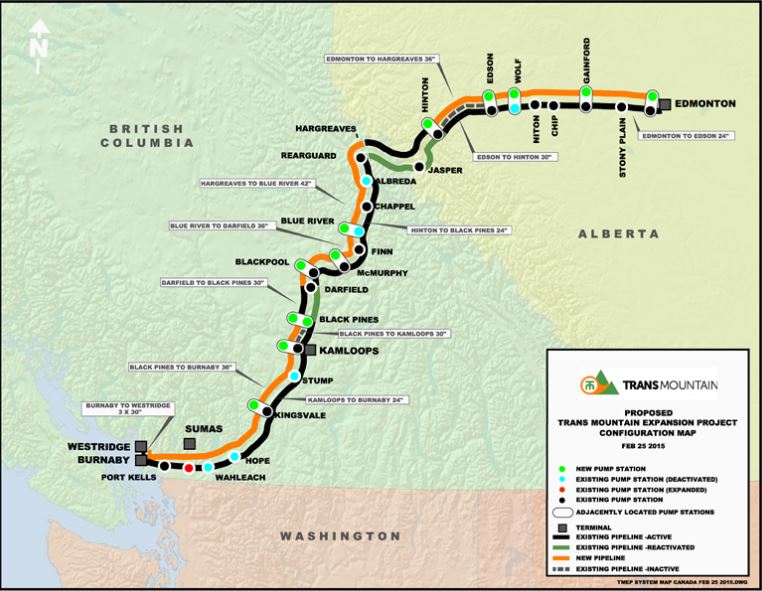Kinder Morgan stalls Trans Mountain spending, delivers ultimatum

Proposed Trans Mountain twinned pipeline expansion project.
By Peter Kennedy
Kinder Morgan Canada Ltd. [KML-TSX] is suspending all non-essential activities and related spending on the Trans-Mountain Expansion Project, warning that it may not proceed.

In spite of assurances last week from Prime Minister Justin Trudeau, who said the pipeline “will get built,” the company said the decision was prompted by continued opposition by the British Columbia government and lack of clarity about the way ahead for the $7.4 billion project, which the company said has already cost $1.1 billion.
However, in a press release issued on Sunday, Kinder Morgan said it will consult with various stakeholders in an effort to reach agreements by May 31, 2018, that may allow the project to proceed.
The company said the focus of those consultations will be guided by two principles:
- Clarity on the path forward, particularly with respect to the ability to construct through British Columbia.
- Adequate protection of Kinder Morgan shareholders.
“If we cannot reach agreement by May 31, it is difficult to conceive of any scenario in which we would proceed with the project,” the company said in a press release, Sunday.
The announcement drew swift reaction from Alberta Senator Doug Black, who has been working to have the pipeline proceed on the basis that it is in Canada’s national interest.
“I am shocked and deeply disappointed for all Canadians by the lack of action from the Federal Government, which has brought us to this brink,” he said. Black called on the Prime Minister to act immediately. “There is no reason that Kinder Morgan should be asked to solve disputes between governments and assume political risks that are completely outside their control,” he said.
During a press conference Sunday, Alberta Premier Rachel Notley said the May 31 deadline is a serious concern for Alberta. She said the pipeline is so important to per province that Alberta could consider becoming a co-owner. “Alberta is prepared to do whatever it take to get this pipeline built – including taking a public position in the pipeline,” she said.
The original Trans Mountain Pipeline was built in 1953 and continues to operate today. The proposed expansion is essentially a twinning of the existing 1,150-kilometre pipeline between Edmonton, Alberta and Burnaby, British Columbia. Expected to cost approximately $7.4 billion, it will create a pipeline system with a nominal capacity rising from 300,000 barrels per day to 890,000 barrels per day.
Kinder Morgan said it had previously announced a “primarily permitting” strategy for the first half of 2018, focused on advancing the permitting process, rather than spending at full construction levels until it obtained greater clarity on outstanding permits, approvals and judicial reviews.
But rather than achieving greater clarity, the project is now facing unquantifiable risk, the company said.
“Previously, opposition by the Province of British Columbia was manifesting itself largely through British Columbia’s participation in an ongoing judicial review. Unfortunately, B.C. has now been asserting broad jurisdiction and reiterating its intention to use that jurisdiction to stop the project,” the company said.
British Columbia’s intention in that regard has been neither validated nor quashed, and the Province has continued to threaten unspecified additional actions to prevent project success, it said.
The company went on to say that those actions have created even greater, and growing, uncertainty with respect to the regulatory landscape facing the project. In addition, the parties still await judicial decisions on challenges to the Original Order in Council and British Columbia Environmental Assessment Certificate approving the project,” Kinder Morgan said.
These items, combined with the impending approach of critical construction windows, the lead time required to ramp up spending, and the imperative that the company avoid incurring significant debt while lacking the necessary clarity, have brought Kinder Morgan to a decision point.
Kinder Morgan Chairman and CEO Steve Kean continued: We appreciate the support shown by the Federal Government and the Provinces of Alberta and Saskatchewan, and we are grateful for the strong endorsements among the majority of communities along the route and 43 Indigenous communities, as well as customers, contractors and unions.
“The fact remains that a substantial portion of the project must be constructed through British Columbia, and since the change in government in June, 2017 that government has been clear and public in its intention to use “every tool in the toolbox” to stop the Project,” Kean said. “The uncertainty created by BC has not been resolved but has escalated into an inter-government dispute.”
Trans Mountain has spent $.1.1 billion (approximately half of which has been spent since the KML IPO) and made unprecedented efforts to develop the project since its initial filing with the National Energy Board in 2013.
